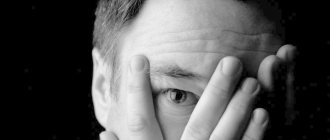There is a fear of disease, a phobia that makes people overly concerned about their health. They undergo medical examinations more often than required, constantly disinfect their hands and their living quarters, and avoid contact with others at the slightest hint that they have infectious diseases. In society, such people are perceived ambiguously. Some find their behavior unjustified and funny, others may feel pity or irritation. But few people understand that behind the complaints “I’m afraid of illnesses” a serious mental disorder can be hidden.
What kind of phobia is fear of disease?
Only a person with a phobia of getting sick is capable of experiencing a real panic attack at the thought that he did not dress warmly enough and might catch a cold. He is suspicious of the slightest deterioration in his health. Banal weakness from overwork, a headache or, for example, an innocent allergic rash makes him think about a serious pathology of the body. He anxiously studies on the Internet the connection between his symptoms and some disease, makes a disappointing diagnosis for himself and falls into a panic.
Even the results of a medical examination and the doctor’s assurances that the client’s health is fine cannot always reassure. Phobia of diseases makes you fear that doctors overlooked something, underexamined something, or simply do not want to tell the terrible truth about the real state of the body. Fear of illness can lead to unnecessary self-medication. In this case, many erroneous actions are taken. For example, a person starts taking pharmacological drugs without a doctor’s prescription, and as a result, his health actually deteriorates. Or, due to fear of AIDS, he disinfects the genitals with a solution of potassium permanganate and refuses sexual activity.
If specialists at the clinic manage to convince the client that the symptoms are not related to the disease he feared, his mood returns to normal only for a short time. Temporary relief is replaced by a search for another terrible diagnosis. He finds one disease more likely than another. Constantly imagines how his condition will worsen in the future, how severe the disease will be.
Symptoms of a phobia to look out for
In society, it is difficult to distinguish a nosophobe from an ordinary person. Symptomatic signs of mental abnormality against the background of fear of infection will be noticeable only in personal communication.
Psychological symptoms of a person who has a phobia of fear of getting sick:
- social isolation and distance to avoid catching an infection;
- anxiety when a situation arises that precedes a possible infection;
- fanaticism when performing hygiene procedures;
- frequent depression and insomnia;
- excessive use of antiseptics;
- Obsession with medical examinations and clinical examinations.
In society, a nosophobe can be seen by several distinctive features. This person is extremely clean, always tries to keep a distance from others, is fond of medical literature and scientific articles about diseases, carefully selects a seasonal wardrobe and is attentive to his well-being.
If someone nearby coughs, the suspicious nosophobe will immediately be seized by panic. Further, the psychosomatic development of the phobia develops in the following stages:
- mental anxiety about possible infection;
- suspicion of infection, accompanied by apathy and depression;
- feverish search and discovery of “symptoms” in oneself, comparing them with signs of known diseases;
- obsessive thoughts about the presence of the disease and subsequent dangers associated with pathology;
- annoying attempts to protect your body, self-medication.
We recommend reading: How to overcome a strong fear of going crazy?
Somatic signs of phobia, fear of infections during a panic attack are visually reflected by disturbances in cardiovascular activity - tachycardia, arrhythmia, hypertension. At the same time, the person experiences chills or sweating, has pain and dizziness, and often visits the toilet due to stomach upset. The development of nervous symptoms depends on the degree of conviction of the patient in the presence of the disease.
If weakness and general fatigue are added to external symptoms, this is a sign of temporary overwork.
Usually favorable results of medical examinations do not suit a nosophobe. He is deeply convinced that doctors are hiding the truth or are making mistakes, so he turns to other clinics or begins self-medication.
What is a phobia of disease called?
The intensity of the fear of getting sick can vary from reasonable to pathological. An exaggerated fear of getting sick is called nosophobia in psychiatry. The name disease phobia comes from the Greek words “νόσος”, which means “disease”, and “phobia” - “fear”, “horror”.
Synonymous with this concept are the terms hypochondriacal syndrome and pathophobia (“pathos” translated from Greek means “suffering”). Sometimes the general fear of getting sick from something terrible takes on more specific forms. For example, a hypochondriac may be tormented by an obsessive fear of infections and pollution - mysophobia, fear of getting cancer - carcinophobia, fear of getting a severe mental disorder - lysophobia.
Even such a particular manifestation of the fear of illness as the fear of infections is a serious phobia and in advanced forms is very difficult. It significantly reduces the quality of life and interferes with normal socialization. Mysophobe avoids being in public places where, in his opinion, they are not clean enough. Using a public toilet is a nightmare for him. At the first opportunity, he washes his hands and treats them with an antiseptic, and carefully separates his belongings from common use, including dishes and stationery.
Nosophobia - what is it?
In psychology, nosophobia is the fear of getting sick. According to experts, this fear is quite common. In adults, it develops against the background of frequent stress, neuroses and other disorders, which have a long-term negative impact on the psyche and nervous system.
Such a phobia does not have a specific object of fear. It combines 2 states:
- a person is afraid of getting sick in general;
- a person experiences fear of a particular disease.
Many people mistakenly call nosophobia hypochondria, since both pathologies have similar manifestations. But they also have serious differences. Hypochondria is a mental disorder associated with the suspicion of not one, but many diseases. The fear of getting sick is usually associated with a specific disease.
To put it in simple terms, with hypochondria the patient suspects that he is sick with all diseases at once. Moreover, even those that he read about on the Internet or learned from friends are taken into account. With nosophobia, a person invents a disease and finds its symptoms in himself.
Causes of pathophobia
Psychologists name the following factors that contribute to the development of fear of disease:
- Previous experience of serious illness. If the disease was accompanied by severe pain, and the treatment process was protracted and difficult, a persistent fear of new possible diseases may develop. The idea that, having fallen ill, one will have to experience physical torment again and dependence on doctors forces a person to always be on the alert and constantly recheck the condition of his body. Now he is afraid of any disease - even the simplest one.
- Pathophobe witnessed the illness of someone close to him. He watched how his relative or friend suffered, and now he is afraid to experience the same suffering. The situation is aggravated if a loved one dies as a result of the disease. This undermines trust in doctors and creates a strong association in the mind between physical illness and death.
- From the point of view of psychoanalysis, pathophobia is the fear of death and is not an independent phobia. The defense mechanisms of the psyche focus the generalized fear of death on only one object - possible diseases.
- Lack of attention. Often, hypochondriacs grow up in families where children can receive love and care only in case of illness. The skill of attracting attention through suffering learned in childhood is carried over into adulthood. The disease allows you to manipulate loved ones, causing them to feel guilt and compassion. Those who suffer from egocentrism and crave to constantly be in the center of attention may develop hysterical hypochondria.
- The style of parenting in the family is based on the principle of overprotection and imposing on the child the role of a sick, weak and dependent family member.
- Psychological personality type. People who often experience fear of getting sick are suspicious individuals with strong imaginations. They are able to imagine in detail the development of any disease so vividly that they easily cause pseudosymptoms. A sick imagination is stimulated by reading reference books of diseases and watching television programs on medical topics. Intrusive advertising of medical drugs creates the impression that the human body is very weak, vulnerable, and illness is inevitable for everyone.
- Autonomic manifestations of the emotion of fear - rapid heartbeat, difficulty breathing, sweating, chills, trembling hands and attacks of nausea - are not always recognized by the hypochondriac as a consequence of anxious thoughts. Pathophobes tend to evaluate the appearance of physical symptoms of a panic attack as a sign of somatic illness.
Text of the book “I'm not afraid of anything! How to get rid of fears and start living freely"
Chapter 4
How to get rid of the fear of getting sick or contracting something from other people?
This fear haunts millions of people. And it is no coincidence - in addition to the fact that we ourselves are naturally afraid of diseases, we are also convinced from TV screens and newspaper pages that it is unsafe to go outside. Medicine, alas, has become big business, and the task of modern doctors is to earn more. And for this you need to properly intimidate the client. And prescribe him more procedures for prevention, for reinsurance.
In addition, you can generally first come up with a problem, and then “recommend” how to solve it. After all, we didn’t know before that a lot of bacteria accumulate in our mouths, and in our stomachs too, that dandruff is a disease, that sweating in the heat is abnormal, that if you don’t drink yogurt in the morning, your stomach will work somehow “ wrong"…
Advertising instills in us some mythical ideas about our health. By following these recommendations, we acquire more and more new needs that have been imposed on us...
Here we will give a few rules, following which you will forget what it is like to be afraid of getting sick.
They are as simple as they are effective, although some of them may raise doubts, since they are very much at odds with stereotypical thinking, which, again, is taken from television. So…
1. Think and talk less about illnesses.
Once my psychology teacher walked with me after class to the subway. It was winter... I noticed: “If you don’t put on a hat, you’ll get sick.” And he replied: “If you don’t want to, you won’t get sick.” Later I noticed that he hardly wears a hat at all - and this is in the Siberian winter!
From the outside it may seem that he is an abnormal person, at risk of developing meningitis, but in fact his knowledge of the laws of life has reached such strength that it is even enough to neglect such obvious things. Remember: “If you don’t want to, you won’t get sick!”
After all, how do we behave at the first signs of a cold? We go to bed, call work and say that we won’t come, we call friends and complain... We constantly repeat the words “sick”, “sick”, “sick” a hundred times a day...
Forget these words! Take your antipyretic and go to work, unless, of course, you have the flu and you won’t infect others. If you have the flu, play not at illness, but at recovery. Treat systematically, intensively. With the desire to be able to work again as soon as possible. Only this approach will help you not get bogged down in your illnesses.
We play at being sick for too long, thinking that we just want to be cured, but in fact we are getting deeper and deeper into the advice of doctors, people's advice, the advice of friends... Now we are already thinking about our illness around the clock, we are getting used to the fact that we are sick . And we come to terms with it. At this moment, the disease defeats us and becomes chronic.
2. Instead of solving a problem, don't create one.
Another stereotype of thinking of a modern person is that for any problem there is a pill that will help instantly. Meanwhile, as before, the slogan of doctors was: “Do no harm!”
This means - don’t write an extra prescription unless necessary, don’t send a person to the pharmacy. A modern doctor can indicate 4–5 drugs in one prescription! Stomach hurts - one medicine, also nausea - but drink this, loose stools - let's add these other drugs. As a result, a person simply does not know what to grab onto. The chief physician usually does not single out. But on this list there is always one single drug, from which the main effect is expected, the rest can be removed.
Raised by modern doctors and television, we know: no matter what we do, no matter how much we ruin ourselves, it can be “treated”!
“Have you eaten so much that you can’t move? Take a pill and the heaviness in your stomach will go away!”
- the grandmother calls from the TV screen.
“Did you drink too much yesterday?
And there is a remedy for this!” - says the young man.
Smoking without much harm, losing weight without dieting... if you believe advertising, a person can treat his body as he pleases, and then “cure” it all.
But why doesn’t a simple thought come to mind: just not create these problems! Don't overeat, don't drink too much, don't smoke... It's so simple!
3. Don't give in to general panic.
Recently the newspapers announced that the H1N1 flu was essentially invented by pharmacists. And how much panic there was! People walked around in bandages; as soon as anyone sneezed, they shied away from the person as if they were a leper. All means to prevent the flu have been swept off the shelves... By the next autumn-winter season, they will apparently come up with something new, which millions of people will again be afraid of.
Think: is this reasonable? After all, there was always the possibility of catching the flu in the subway or public transport! But we only put ourselves “at risk” when we have been told so.
Let's speculate... In the subway you can catch scabies, domestic syphilis, and anything else, even plague and anthrax. Wouldn't it be better to wear a protective suit, similar to what people wear in virology institutes? After all, this can lead to paranoia!
Think about how people lived before, when the only means of disinfection were laundry soap and alcohol. And this is not always the case... On the one hand, many viruses did not yet exist. But many of those who now live in test tubes have mowed down thousands of people! For example, typhoid fever... In general, the conclusion is simple: as much as we are afraid, we risk getting infected.
4. Don't be offended by your illness.
This formula was derived by the world famous writer A.I. Solzhenitsyn. He is one of the few who was able to recover from cancer, so we think he can be trusted. Solzhenitsyn, who observed sick people in the “cancer ward,” noted that those who become embittered and begin to fiercely fight their illness, instead of trying to understand why it was given to them, certainly die. He encourages you not to complain under any circumstances, but to humbly accept the suffering you have suffered. For such a position, of course, you need to be a true Christian, but think: what’s the point of complaining and getting angry? Did this make anyone feel better? But we complain as soon as we feel unwell and describe our problems as some kind of utter torment! Meanwhile, they were nowhere near the hellish torments that real patients suffer. Think about it... Are we setting ourselves up for big trouble with this attitude?
5. Let's fight back the disease by not paying attention to it.
Meanwhile, along with not being angry at the disease, there is a second side to the matter, warning against the other extreme. Often we begin to “carry around” with the disease like a sack, studying all its nuances and providing it with all the conditions, the most important thing is to limit ourselves. Here is what the writer Mikhail Zoshchenko, who suffered from heart disease, said about this: “A person should not fight the disease, because this fight causes the disease. You need to give up ambitious desires, rise with your soul above squabbles, and the disease will go away by itself! I have to train myself and not believe in my illness before everyone else.
I have a heart defect, and before I was inventing to myself that I had a pain in this and that place, that I couldn’t do this and that, and now I had a fit, but I said to myself: “You’re lying, you’re pretending,” and continued to walk no matter what. nothing happened... Previously, I couldn’t fall asleep when there was noise, but now I deliberately take a hotel room next to the people’s room. To hear constant calls and still sleep!”
Zoshchenko, who lived quite a long life after these words, understood the main thing: you need to fight! But not with the disease - but with yourself who is sick, with yourself who is afraid...
After all, the disease sits in us as long as we believe in it and are ready to accept it.
Terrible diagnoses...
But fear of getting the flu is one thing, and AIDS or cancer is another. Many people are subject to this fear, because previously it was customary to hush up terrible diagnoses. Now this has changed, and almost everyone knows that many of our favorite artists have passed away due to cancer. The newspapers are full of advertisements: “ Help raise money for the operation!”
»
Many people have the feeling that everyone will eventually die from incurable diseases... According to one survey by the Health publication, eight out of ten people answered the question “What are you afraid of?”
This is exactly what they called – the fear of contracting an incurable disease.
Well what can I say? Instead of being afraid, let's think about how we need to live so that such a disease does not occur
. If you do not have a hereditary predisposition, only psychological reasons can drive you crazy. It is precisely the psychological background of serious illnesses that doctors are increasingly talking about, and psychotherapists are simply shouting.
If you want to stay healthy, do not forget that any negative emotions have a detrimental effect not only on our mood and nervous system, but also on the body as a whole.
If you think about it, you can even remember how it happens.
We think intensely about something unpleasant - and we get a headache. We are offended and feel pain in our chests, in our hearts.
We get angry and our hands begin to shake, a hot wave runs through our body... All these are physical reactions of our body to unwanted emotions. Experiencing them time after time, the body reacts with diseases. It seems to signal us: don’t torture me, master! Stop! But when a person gets sick, he has even more negative emotions, and most often he does not stop...
So, it turns out that if not everything, then a lot is in our hands! We have the power to protect ourselves from emotions that lead to illness!
After all, we hope you don’t think that emotions are the result of the activities of others?
No matter what happens, it is up to you to decide how to react to the situation. What emotions should you be afraid of
like fire, so as not to be afraid of diseases later?
• Self-criticism.
It’s not for nothing that psychotherapists working with cancer patients say: cancer cells are cells that are “offended” at us.
Because the person carried negativity inside himself. Not sparing himself, he engaged in self-flagellation, analysis of his flights, in short, he ate himself from the inside. Therefore, if you have such a habit, know that it is very harmful! If, during attacks of self-flagellation, you experience gnawing melancholy, you have a sick feeling in the pit of your stomach, and your stomach hurts, it means that undesirable processes are slowly but surely occurring in your body. Is it worth it? Change your tactics! Not only stop reproaching yourself, but, on the contrary, repeat every morning seven times: “I am pleased with myself!
I'm great! I’m starting everything from scratch, and I don’t regret the past!” • It is very important not to regret, even if you made a mistake. It is in this habit of punishing oneself for the past that lies the essence of self-criticism, which literally “corrodes” our soul.
• Resentment.
No less harmful than being offended by yourself is holding a grudge against others. When we are offended, we take on bad emotions, which we then “grind” within ourselves. It’s not for nothing that it seems to us that the offender “hit” us with a look, a word... A nagging pain arises in the chest, which seems to come from within. This is how resentment is experienced! And in exactly the same way - oddly enough - we experience a feeling of guilt when we offend someone. Ask for forgiveness for your words or actions. Forgive the one who offended you. And you will immediately feel that the unpleasant sensations have left your body, you feel light and good. Shouldn't you think about living like this forever? To prevent yourself from being offended at all?
Of course, only enlightened people and monks and holy people have achieved the ideal so far. But at least by getting rid of the habit of instantly reacting with offense to everything unwanted that happens, you will do a good deed for yourself.
• Anger.
Oh, what harmful emotions these are for health! They say, however, that there is a feeling of “healthy anger” that helps in work. But this seems to be the same phantom as “white envy” - no one knows for sure whether it exists or not. When we are angry, everything inside us bubbles and shakes. We, figuratively speaking, “lose our temper.” The result is stomach diseases, because the person does not seem to “digest” the situation, does not accept the events or people who surround him. As a result, his anger did not make anyone worse, only himself. Because the person caused energetic damage to his body and became ill. Avoid anger like fire! It is unproductive, meaningless and does not bring anything good. Avoid open conflict—screaming, swearing, accusing someone to your face—until the last moment. Because it will bring you nothing but harm.
As soon as you feel yourself getting excited, remember something good. Remember how good it is to simply live!
And your offender or “circumstances” have nothing to do with this process. Remember self-preservation!
By the way, it was precisely those people who realized that the disease signals us about the need to change our lifestyle, who were ultimately cured.
For example, the famous writer Daria Dontsova, who, having heard the “verdict” (the fourth stage of breast cancer), did not bury herself, but was distracted by creativity. It was the illness that forced her to write books, including about what happened to her.
The writer Alexander Solzhenitsyn also defeated this disease and professed the same principle: “Don’t be offended by your illness! Do not complain! Think about what you need to change about yourself?”
TV presenter Yuri Nikolaev went to church before the operations and there he realized that he had treated his loved ones too cruelly. Having changed his behavior, he noticed that he no longer had anyone to be angry or offended with, he believed in his healing, and the disease receded...
In general, you should not think too much about serious illnesses. But you should think about how to protect yourself from what could be their cause.
CONCLUSIONS:
• No matter how afraid you are of getting sick, becoming infected, falling ill - don’t talk about it. Try to deceive the disease that in your mind is guarding the victim. She prefers people who are insecure.
• When you get sick, think not about illness, but about recovery. If your environment is trying to make you sick, reassure
tell him that everything is fine with you. Don't be angry at your pain, but don't give it too much attention.
Do not take pills for every minor ailment. It’s better to think about why the problem arose and change something in your lifestyle.
Chapter 5
How to overcome your fear of insects?
Apparently, few will skip this chapter... Although most of those who experience this fear are residents of the city, not the village. And that is why they experience this fear! As we have already said, habit makes fear no longer so scary, and then completely eliminates it.
That is why, if you are seriously burdened by this phobia and seriously want to get rid of it, we can essentially advise you only this method - knock out the wedge with the wedge. Go to the village or at least to the country. There flies, mosquitoes and even horseflies and bees live in peaceful proximity to humans and domestic animals.
Well, how to say in a peaceful way... There’s simply nowhere to escape from them if there are fields and forests all around. At first, the presence of “flying reptiles” is very annoying, but then you begin to get used to them. Calmly go into the wooden house that serves as a toilet, and no longer chase every fly with a firecracker throughout the hut. It flies and let it fly, as long as it doesn’t fall into a bowl of soup. And then you will get used to it to such an extent that when a fly falls into a plate, you deftly scoop it out with a spoon and continue eating...
Don't believe me? Check it out! The author knows what she is talking about because she lived in the village. No one there has the phobia we are talking about. There is only quiet anger at the flying creatures that buzz and bite.
But, of course, we won’t stop with just this advice. After all, we know firsthand what a person is who is afraid of flying reptiles like fire. The presence of just one mosquito can paralyze a person! And if a spider appears from somewhere, for example from a window, the person will not sleep, he is ready to call the Ministry of Emergency Situations... And it seems to us that this is simply irresistible. Disgust mixed with fear prevents us from even approaching and swinging a slipper. We are disgusted and scared! This fear undoubtedly sits in my head. And you have to work with your head.
We need to find a thought that will make us turn in the other direction. We need something to convince our mind so much that it stops leaving us at “moment X.” And you must admit, when we shout: “ta-raaa-kan, mommies!”, there is no reason with us. We are afraid unconditionally and strongly, like children...
So, first...
• Give yourself the attitude: I’m not afraid of them, but they’re afraid of me!
Yes, yes, just try to imagine and put yourself in the place of these “creatures”. You are afraid of a small bug, and in the mind of this bug, you are for him a huge mass of “something”, only your slipper obscures all the light for him, and darkness covers him. In horror, he tries to crawl to the crack in the baseboard, but no such luck...
Of course, insects are afraid of us, and we are afraid of them, just their species. Without realizing: they cannot, are not able to cause us real harm. The maximum is a bite from which you will not die. For an insect, we are inevitable death. So isn’t it funny that we tremble with fear at the sight of a bug?
• Act without hesitation!
The way to philosophize is when we work on our fear without experiencing it. If you see a cockroach or mosquito in front of you, immediately grab a slipper or towel and fight. Be afraid, but fight! Say: you crawled (flew) into my territory! I won't let you disturb my peace! And if you are so disgusted with cleaning up the “corpse” of your enemy, you can suck it up with a vacuum cleaner, as my husband, who is very afraid of insects, does. It’s beyond him to understand how I can crush cockroaches with a piece of paper and sit quietly when a fly lands on the jam I’m eating...
So, don’t sit in horror, closing the door to a room conquered by the enemy. Don't let them restrict your movements in your own apartment!
Take action, and then fear will no longer seem so insurmountable.
• Don't kill in vain.
And yet I would like to say a few words in defense of insects. We do not encourage you to allow cockroaches to breed in your apartment. But still, remember the right to life, which was not given by you, of everyone, even the smallest, most disgusting creature in your opinion.
One day I went to the village and we went into the forest. That year there were a lot of furry caterpillars; they were often found on the road. Red, black... I felt sorry for stepping on them, and when I walked through the forest, I carefully walked around each one and didn’t crush a single one. Why, exactly, should I press them, since they’re not crawling around my apartment?
But in the morning, when I was going to the post office, a bark beetle crossed my path. Hurry, hurry to the shelter! Thank God that he did not catch the eye of the boy vandals. I feel sorry for him, and I patiently wait for the beetle to cross the road...
When my father wanted to pour boiling water on an anthill that was breeding in the wrong place, I didn’t allow it either...
Everything has the right to life! We have the right to fight and kill only when the “enemy” has flown or crawled into our territory.
So, fight fear gradually and systematically. Tell yourself: “I will no longer allow insects to terrify me. Let them be afraid of me!”
But if you see an “enemy” on your territory, act overcoming your disgust. And having neutralized it, don’t think about it anymore. After all, everyone who is afraid of rats, insects, snakes knows that fear can overtake us not only at the sight of real danger, but in the imagination!
How often do we encounter rats in everyday life? However, when we hear on the news that somewhere, in some area of the city, rats have besieged a residential building, we feel uneasy. Rats begin to appear from every corner...
Work on yourself and start with the realization that these creatures of God do not exist to make us faint. They simply exist. On your own, and you on your own.
We go no further in our advice. If all that has been said has not made an impression, then keep in mind that fear of insects is one of the phobias with which it is not a shame to go to a psychotherapist. If your mind is no longer able to help you, and you experience this fear every day, contact a specialist so that he can work with you individually.
CONCLUSIONS:
• When you see an insect, do not remain idle. Channel the negative energy you have into something useful. Do not call your household, do not run away, but try to drive the insect away from your territory yourself.
• For training, visit a place where there are a lot of insects. Only in order for there to be an effect, you need to live in a country house or in a village not for a few hours, but for at least a week.
• If you feel that your phobia defies reason and is significantly poisoning your life, consult a psychotherapist.
How to stop being afraid of getting sick?
An obsessive fear of getting sick is a well-correctable condition. When choosing treatment methods, drug therapy is usually rejected by specialists, since the need to take medications increases the client’s hypochondriacal fears. Preference is given to psychotherapy and suggestive therapy.
Psychotherapy
The first psychotherapeutic sessions are considered the most difficult stage in the treatment of fear of illness, since a nosophobe has difficulty trusting doctors. The psychologist must first gain the client’s trust, form a cooperative model of relationships, and only then proceed directly to the treatment of anxiety-phobic disorder.
The main therapeutic technique is exposure and response prevention, which involves intentionally stimulating fear. For example, with mysophobia, a client, under the supervision of a psychotherapist, plunges his hands into the dirt and learns to cope with the anxiety that arises. As the situation becomes familiar, the fear of illness fades away. The method also allows the client to become convinced that their fears are unfounded and to break the vicious circle of “anxiety - fantasies about illness - checking the state of the body - increasing anxiety.”
For treatment, the method of paradoxical intention is also used in the form of a planned “hour of anxiety,” during which the nosophobe deliberately conjures up his worst fears and lives them. You can learn more about the method from the video:
To get rid of the fear of illnesses, the method of stopping thoughts is also used. When anxiety occurs, you need to identify the thought that caused it, tell yourself “Stop!” and switch your thoughts to something pleasant. It is easier to use the method if you supplement it with visualization. That is, create in your imagination an image of how the unwanted thought disappears. For example, you can imagine fear as a piece of sugar and dissolve it in water, or as a balloon and release it into the sky.
Hypnotherapy
Not everyone manages to muster up the courage to treat phobias using exposure methods or to soberly analyze automatic negative thoughts. Hypnotherapy is indicated for such individuals. We recommend contacting psychologist-hypnologist Nikita Valerievich Baturin.
Hypnosis sessions for the treatment of fears are painless, because they involve immersion in a deep relaxing trance. Using special techniques, the hypnotherapist instills in the client new positive beliefs, which become the basis for a new, optimistic worldview and good health after leaving the session.
Another advantage of hypnotherapy is the relatively short duration of treatment. For mild forms of fear of illness, only a few sessions are enough to achieve the necessary changes in the client’s subconscious, while psychotherapy requires weekly visits to a psychologist for at least several months.
Varieties of manifestation
Pathophobia is a mental disorder. It belongs to the category of those phobias that are difficult to diagnose. Its manifestations are easily confused with ordinary diseases.
Having such a phobia has consequences. Pathophobes avoid mass events or large crowds of people. They do not travel because they are afraid of tropical infections. People don't make new acquaintances. Even food selection becomes a problem. For a healthy lifestyle, you need to choose high-quality and fresh products. It's not easy to do.
Suspiciousness in pathophobia
The life of such a person turns into a chain of dangers that can appear at any moment.
This is a test not only for the patient, but also for his family and friends. People who suffer from the fear of getting sick often cause hostility due to their excessive attention to health. Their panic fear frightens those around them. The patient's loved ones suffer.









